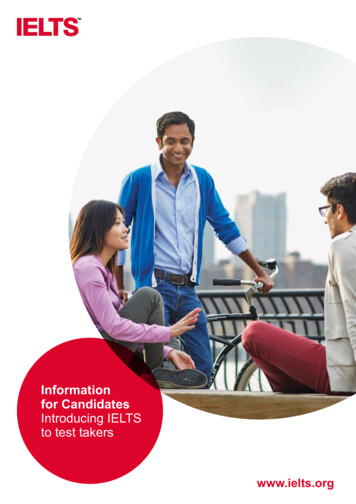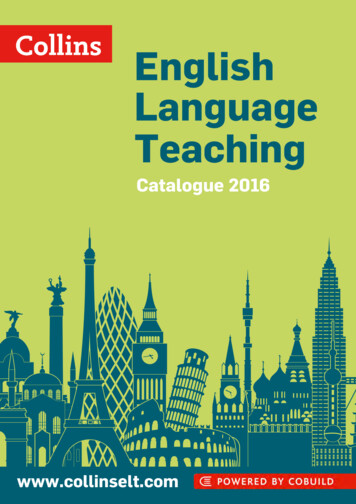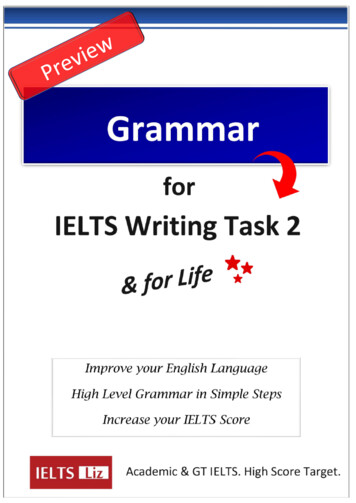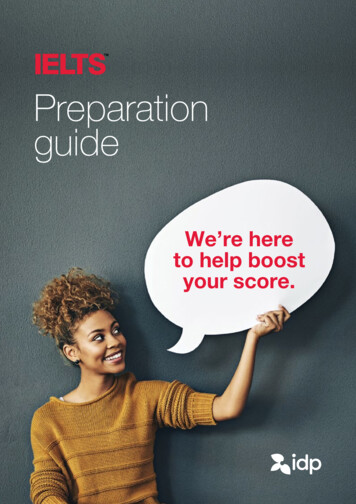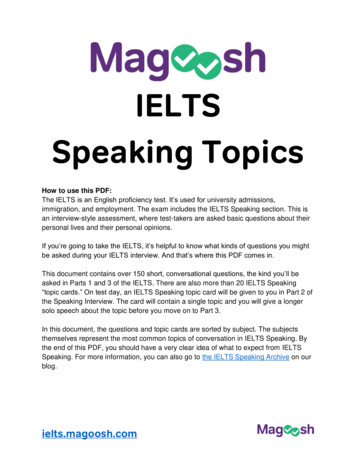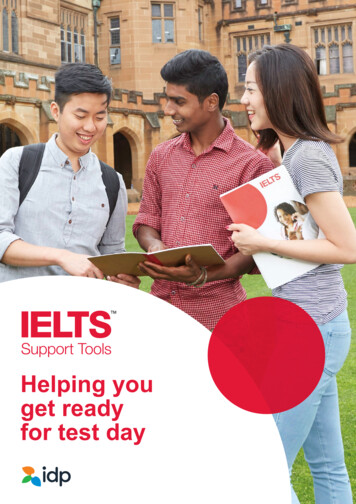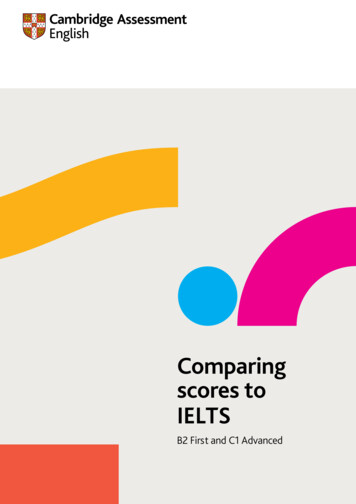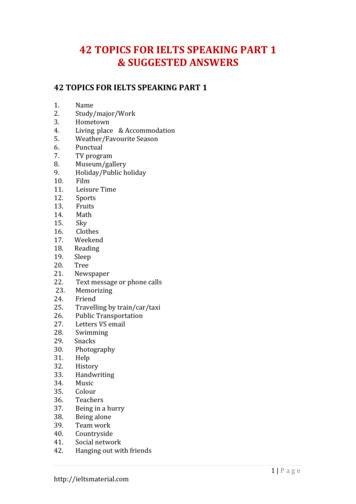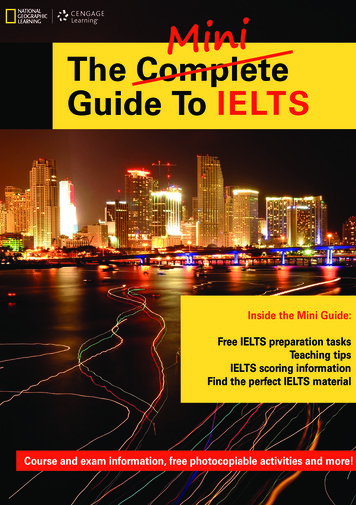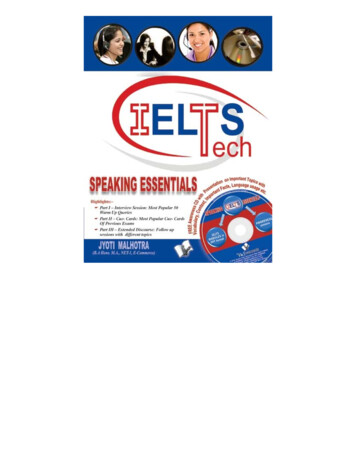
Transcription
SPEAKING ESSENTIALSJyoti Malhotra(B.A Hons. M.A., NET-1, E-Commerce)V&S Publishers
Published by:F-2/16, Ansari Road, Daryaganj, New Delhi-110002011-23240026, 011-23240027 Fax: 011-23240028Email: info@vspublishers.com Website: www.vspublishers.comReg ional Office :Hyderabad MumbaiFollow us on :All books available atwww.vspublishers.com Copyrig ht:ISBN 978-93-505743-5-5Edition : April 2015
ContentsDedicationAcknowledgementPublisher’s NotePrefaceChapter 1 Interview SessionChapter 2 Cue CardsCue - Cards Related to Importance/Values/RolesCue - Cards on Siblings /Relationships /IdealsChapter-3 Follow UP SessionChapter 4 : Speaking Test PapersSolved Speaking TestPractice Speaking Test
DedicationI, with due respect and profound privilege, serene dignity andfolded hands dedicate my small piece of research program tomy devoted and dedicated parents, Mrs. Kiran Malhotra andMr. Pradeep Malhotra for their wholesome support and theirdignified ambience which they offered me to sail the boat ofmy life on the path of hardwork and determination. I am reallyvery thankful to both of them for blooming my life with theirhumble ambience.
AcknowledgementThere is a big vote bank of thanks in my whole projection of this project to my worthyparents, Mrs. & Mr. Deep Birla, My Guide, Mr. Parminder Singh Bhogal, Caring Brothers &Sisters - Mrs. & Mr. Rohit Gandhi, Mrs. & Mr. Aman Malhotra and Mrs. & Mr. SandeepMalhotra.My heartiest thanks to my life partner, Mr. Deepak Malhotra (husband) and the little steps ofmy Angel, Ditya Malhotra (daughter).I am really grateful to be a part of the V & S Publishers who support my research analysiswith their expert team of publishing. I am really very thankful to Mr. Sahil Gupta (Director)and Mr. Binay Srivastava for their wholesome cooperation to convert my research programto a complete masterpiece.RegardsJyoti Malhotra
Publisher’s NoteV&S Publishers has recently ventured into the field of Academic Books with the launch of theGen X Series. ‘Gen X’ stands for ‘Excellence in Generation ‘X’. The series comprises booksfor aspirants of various competitive examinations. Hence, following the success of ourprevious books in this series, we decided to launch a series of IELTS or the InternationalEnglish Language Testing System books under this series. The subject has been divided intofive main parts which has been grouped into five books by the author, such as: IELTS TechAcademic Module, IELTS Tech-Writing Essentials, IELTS Tech-Vocal Cosmetics, IELTSTech- General Module and IELTS Tech- Speaking Essentials for the students, who aspire tostudy, work or settle abroad.The books in this exclusive Series are written especially for the Indian students who wish toappear in the IELTS exams. Most of the foreign books available in the market on this subjecthave been written keeping in view the foreign readers and at times, may appear Greek to thestudents from India, primarily because of issues related to accent, grammatical aspects,spellings, etc. Therefore, the need for these books was felt by V&S Publishers and theauthor ’s extensive research on this subject was carefully moulded to present it in the form offive perfect books on IELTS, specifically for Indian students.Each book contains Skills, Strategies and Guidelines written in a simple manner along with aCD that accompanies the book which is also one of the unique features of this Series. The CDsare interactive and illustrative and presented in a manner that even an average student cangrasp the contents and master the language easily and quickly. So, V&S Publishers hopes thatthrough these books, we can offer the IELTS aspirants – A Smarter Way to Learn TechnicalEnglish nationwide.
PrefaceThe book is specially designed to investigate what skills and strategies are required in writingand speaking modules that distinguish the IELTS proficiency levels. There are a number offactors like Word Stress, Intonation, Rhythm and Cohesive Devices, which is required onbehalf of the IELTS candidate in order to determine their assessment over four band scales:Fluency, Grammatical Range and Accuracy, Lexical Resource and Pronunciation. But how toattain all these skills is still a matter of discussion. Without understanding these technicalaspects of English language, it is difficult for the IELTS candidate to score better in IELTSSpeaking Test as this is the criteria for their oral proficiency. In non-native English countrylike India and China, no preference is given to learn all these skills. Only few study materialsare provided to them to memorise the answers. No preference is to be laid in building ofRhetoric among the candidate. The major objective of the book is:Making the IELTS candidate proficient in speaking test by teaching them all theRhetorical devices like Word Stress, Intonation, Rhythm, Cohesive Devices, Fluency,Lexical Resource, etc.All these techniques should be properly designed and provided to the students in theform of study materials.Sound recorder (self-created by students in mobile phones) software should be usedto maintain the Rate of Speech in the IELTS Speaking Task 2Speech therapies should be given to the students to twist their tongues in L2.In 2001, the IELTS interview format and criteria were revised. A major change was the shiftfrom a single global scale to a set of four analytical scales focussing on different aspects oforal proficiency. This study is concerned with the validity of the analytical rating scales. Itaims to verify the descriptors used to defne the score points on the scales by providingempirical evidence for the criteria in terms of their overall focus, and their ability todistinguish the levels of performance.The Speaking Test Band descriptors and the criteria key indicators were analysed in order toidentify the relevant analytic categories for each of the four band scales: fluency, grammaticalrange and accuracy, lexical resource and pronunciation.Speaking Skills Checklist is as follows:Production Skills, Pronunciation: Rhythm, Number & Length of Pauses, Stress, Intonation,Contours.Communication Skills: Fluency, Clarity, Coherence, Confidence, Cultural Appropriateness,etc.Language Skills: Grammatical Accuracy, Grammatical Range, VocabularyBut how an IELTS student will build these skills is still the matter of discussion. The IELTSBooks/Instructors or even the organization of IELTS are silent in this matter. No doubt, wecan get this matter by netsurfing over different websites but what about the authenticity of thestudy material. The main problem in a non –native English country like India is that how
students twist their tongues in L2 (English language) because while learning, theyautomatically get the infiuence of L1 (Mother Tongue) because it is their native language, andthis is natural, so nobody can avoid it. But learning global (English) language with the help ofVocal Cosmetics/Rhetorical Devices will improve their tongue twisting into L2 (SecondLanguage Acquisition) which automatically improve the proficiency of the candidate in theIELTS Speaking and Writing Test.Keeping this viewpoint in mind, I have decided to put forth some technical aspects oflearning, writing and speaking English through the medium of this book.This will truly helpthe students to speak good and perfect English.
ABSTRACTINTERVIEW SESSIONIn this part, simple warm up questions based on candidatesnames, place of residence, leisure, preference, etc. are asked. Itconsists of 7 to 8 questions. This part covers the most popular50 Interview Questions which are generally asked by theIELTS instructors. In exam this section is divided into twocategories, i.e., phase A & Phase B. Phase A has 4 questionswhich are related to Hometown, study & work & Phase B hasanother 4 questions related to Leisure, Hobbies, Food,Friendship, Shopping etc.
Chapter 1 : Interview SessionMOST POPULAR 50 QUESTIONS (INTERVIEW SESSION)INTERVIEW SESSION1. What is your full name ? What should I call you?Ans. My name is Ankit Bhardwaj. You can simply call me ANKIT.2. Can I see your ID?Ans. Sure . Please.FAMILY3. Tell me something about your family?Ans. Well . I belong to a simple, small and nuclear family. I am living with adorable parentsand two small sisters. All coordinate with one another and live happily. I must say God hasblessed me with “A CLOSE KNIT FAMILY”4. What do you like doing most with your family?Ans. I like to have long meals, amusement, fun and frolic, would like to tease my sisters,sharing griefs and sorrows with them. These is a common saying – “The family which eatstogether, lives together and laughs together is truly a close knit family.”5. Who are close to you in your family?Ans. Well I am very close to my mother, “A true picture of maternity”. She cooks what Iwish to eat. She loves and teaches me what is good or bad for me. She is really a very virtuouslady with the blend of passionate feelings of a child. I wish to salute this real role model andadmire this wonderful creation of God on this planet.6. In what way is your family important to you?Ans. My family is everything to me. My family members are my best friends and they supportme in every real challenge of my life. I know they are always with me, no matter what. Theyare not only my best friends, but we truly are tied with strong bonds of respect, unity andstrength. That’s why I used to say my family is my real earned wealth and strength.WORK7. Do you work or are you a student?Ans. I am a very hardworking person. Presently, I am doing both the tasks simultaneously. Inthe morning hours, I usually go for my orientation classes of language as I am fond of
learning linguistics and in the afternoon, I am working as an executive in a reputed company.8. What are your responsibilities at work ?Ans. My responsibilities include keeping an eye upon the junior executives for maintainingorganisational goals and objectives and so keeping supervision over them, checking theirtargets as well as maintain coordination and proper communication is my main work.Thorough commitment to work is my first and last responsibility towards work.STUDY9. Do you work or are you a student?Ans. I am a student at the moment. I am studying English Linguistics and literature togetherand hoping to get more and more excellence in this field.10. Why do you choose that course or job?Ans. Honestly speaking, as everyone knows English is a global language. It serves bothsocially as well as professionally. Because what I believe socially, it is the order of the dayand professionally it is ‘A Bag of Handsome Perks & Incentives.’11. What is the most difficult thing about your studies or job?Ans. The most difficult thing about my studies is its grammatical rules and lexical part. Itsreally difficult to remember high profile words and proverbs. Moreover, grammatical ruleslimits my tendency to learn the things.12. What type of study most of the students prefer these days?Ans. Very interesting question, see The ultimate goal of every education is to earn good,so most of the students these days tend to fall upon more professional studies despite ofacademic ones. Because these types of vocational studies widen up their empirical outlookand open their arenas for the professional world.HOBBIES13. What are your hobbies?Ans. There is no one thing I’m fanatical about. I have various interests. I am a keen cook andlove to make new dishes. I love reading books. I am creative too and love to follow newtracks ever day. Frankly speaking, hobbies add charms to life and pull out the hidden talentsand abilities.14. What do you like about your hobbies?Ans. Well .the thing that really fascinates me about my hobbies are that it pulls out myhidden talents and abilities. It brings positive changes in my life. It proves to be a creativeutilisation of time. It is the best way to refuel your body and mind.15. What type of hobbies are popular among teenagers in your country?Ans. Actually, hobbies are personal tastes of every individual. As far as my country’s teenagehobbies are concerned, I must say that among boys hobbies like getting involved with online
friends, regular visitor of Orkut, Facebook and Twitter, Net surfing, health resorts, gyms andspa, sending SMS, etc. and among Girls are STORIES, Puzzles, Chatting, Tidbits, CreativeArts, etc.FREE TIME, LEISURE16. What are the best ways to utilise your free time?Ans. A ‘Hobby a day keeps the doldrums away.’ So the best way to utilise your free time is toget completely involved in doing which you like the most. It is really benefcial for everyoneto cultivate a suitable hobby to help in the proper channelization of free time.17. Do people have more free time now than in the past?Ans. It’s really quite ironical to say, as we are living in the gadgetry and luxurious worldwhere labour saving machines, such as washing machines and dishwashers are prevailing yetpeople are too busy in the rat race of earning and spending money. They don’t have time tospend with their relations. But in the past, almost all the work was done manually, still peoplehad time to eat and laugh together.18. What is the impact of leisure activities on society?Ans. The impact of leisure activities on the society is spectacular. It becomes a pattern or styleof living for the entire society. Everyone follows the same pattern of living and theycoordinate their lives accordingly. They can plan their schedules and programmes as per eachother ’s conveniences.FRIEND, FRIENDSHIP19. How do you usually contact your friends?Ans. Well I usually get very less time to contact my friends, but I always try my every levelbest to call them or chat with them online.20. Are friends as important to you as your family?Ans. Friends and family, both are invaluable and no doubt, both act as a four-leaf clover, hardto find and lucky to have.21. Do you think friendships change as we get older?Ans. Very true. Gone are those days when friends used to truly love each other. Nowadays,fake friendships are in the air via various technological advancements like the Facebook orTwitter. Nobody remembers his/her childhood friends.22. Whom do you call best friend?Ans. According to my opinion, a Best Friend is much beyond roaming together and sharinggood moments. It is about friendship with someone who comes to rescue you from the worstphase of life. Friendship with your best friend is eternal.HOMETOWN23. Describe your hometown. (Individual Opinion, because candidates have to answer
according to the place where they are residing.)24. Is your hometown in the grip of problems?Ans. Undoubtedly, the general problems of my city these days are overpopulated streets,pollution, traffic embezzlements, etc. Some problems shiver down my spine like the evils offemale foeticide and hooliganism.25. What changes would you like to have in your hometown?Ans. Very interesting question. Well if I am given an opportunity to change my hometown, myfirst priority will be to provide homes to the slums, then encourage every student of the city tobe literate and educated, and last but not least, to bring technical back up for my city.TRAVEL26. Do you think it is true that travel broadens the mind?Ans. I do, yes it is true. Travel and change of place impart new vigour to the mind.Travellers never think that they are foreigners. Rather, you see, different ways of living, suchas, eating, drinking, interacting with others,etc. allows you to analyse your own culture moreobjectively.27. Do young people and older people get benefits from travelling?Ans. Well for youngsters, travelling is an adventurous experience but for older people, itis more of relaxation than enjoyment because while travelling, they get switched off fromtheir regular duties and routine work. Moreover, it is advantageous for both the generation togo for travelling, as it is an eye opener when we observe people of different states orcountries and are familiarised with their lifestyles. There’s a common saying – ‘The World isa book, and those who do not travel, read only a page.’28. How do you usually travel to work or college?Ans. Well The Metro or Bus are the only means of transport in our city from one place toanother. Generally, I travel to the place of my work via Metro, as it is the cheapest means oftransport as well as it saves time and petrol savvy.29. Which place do you like to visit the most?Ans. My country, India is a tourist’s paradise. Well if I get an opportunity, I would like tovisit Kashmir, the real paradise on earth. It is a completely blend with natural beauty, ethnicsplendour and cultural diversity. It is the ‘CROWN HEAD’ of India.ENGLISH LANGUAGE/LANGUAGE LEARNING30. How do people in your country feel about English being the world language/?Ans. There is no such feeling in learning the English language. Everyone knows it is a globallanguage, so learning is automatically inevitable and everyone has to embrace this globallingua franca not only for communication, but also for their economic benefits.31. Do you think the culture of English Speaking Countries as well as the Englishlanguage dominate the whole world?
Ans. Undoubtedly I do believe the usage of Internet really allows the scope of English oninternational grounds. It becomes a trendy language these days. No doubt, these days itbecomes the wine upon the lips.32. When & where you began studying English? Do you face any problem whilestudying English?Ans. As you know, I belong to India so English is not my mother tongue As it my nativelanguage. I began learning this language in my school when I was 5 years old. Learning theEnglish language for the first time can be difficult. However, when done in an exciting andhumorous way, learning English vocabulary and grammar are less confusing and moreenjoyable.33. What is the most effective way of learning English ?Ans. The best way of learning English is to Listen properly. It can be with any source likeEnglish Native Speakers, Some English Audio DVD’s or CD’s, Watching English Movies, etc.FESTIVAL34. What is the most important festival of your country?Ans. AHHHH . The festival of lights, i.e., Diwali is the most important festival of mycountry. It comes in the month of October or November. It is related to the Hindu and Sikhhistory. It brings everyone together under one roof of happiness and prosperity. It provides anopportunity to meet friends and relatives. It strengthens our social bonds. It breaks themonotony of hectic and engrossed life.35. Can you define festival, how is it celebrated, and why is it celebrated?Ans. Festivals act like vehicles that carry our culture, religion and history to the newgeneration. Well, I must say it is an occasion where everyone enjoys fun and fiesta. Duringfestivals, we meet our friends, sit and share with them meals and laugh for long hours. It iscelebrated as a symbol of our conventions and customs.CULTURE36. Do you think the culture of your country influences you?Ans. Yes.I do it reflects in your personality the way you eat, the way you dress, the way youadopt different lifestyles, its values & beliefs, etc. It is the widening of minds and spirits. Itteaches you how unity can be maintain in the diversities of culture.37. Which culture is the best, ‘Indian’ or ‘Western’?Ans. Well the culture never teaches you anything wrong. It is the thinking capacity of theperson that allows you to think this is Indian or Western. The Indian culture is alreadyenriched with values and that’s why it is incredible and the Western culture is completelybased on Facts of those values, so I think no comparison exists between both of them. Bothteaches the real virtues of life.38. How has your country’culture changed in 50 years time?
Ans. Change is the law of nature, but sometimes, it’s frightening to accept the change. Culturedoes not change because no doubt it is accepted by the society in different ways but its valuesand norms always remain the same. Earlier, it was limited to customs, but now it isinfluencing our deportment, etiquettes, mannerisms, food habits, etc. It would not be wrong tosay that it is our ‘Signature’s style’ these days.LIFESTYLE, HEALTH, KEEPING FIT39. Why do some people think that modern lifestyles are not healthy?Ans. See, people have a valid reason for thinking so. People today love comfort and luxury,and they want to satisfy their appetites at any cost. Rather than cooking at home, they love toeat out at restaurants and fast food joints. Fast food may be tasty, but contains a lot of fat that isnot good for health. Previously, people used to walk or engage in some kind of manual work.That is not the case today. Personal vehicles and modern devices have made their life easy andpeople have a great aversion towards sweating their bodies. This lifestyle naturally invitesdiseases.40. Why do some people choose to lead unhealthy lives?Ans. The simple answer is laziness. Today many people do not have the discipline to lead ahealthy life. They love comfort and convenience in everything that they do. In fact, they don’trealise that their comfort and luxury are going to end soon. They need to face the realitysooner or later.41. Should individuals or governments be responsible for making people’s lifestyleshealthy?Ans. It is the individuals themselves who are responsible for making their lifestyles healthy. Itis one’s personal freedom to lead a healthy lifestyle. The government has nothing to do withit. No government can interfere into such personal affairs. The government can’t ask peopleto eat this or that. The only thing that government can do is to spread awareness about thisissue. Nothing more than that.42. What could be done to encourage people to live in a healthy way?Ans. The best way to encourage people to live in a healthy way is to spread awareness aboutthe consequences of an unhealthy lifestyle. This can be done through the media like televisionand newspapers. At an early age, children should be given education about the importance ofa healthy lifestyle. It should also be included in the curriculum. Moreover, sports should bemade compulsory in schools. Another effective way is to give gym and sports facilities infactories and offices.MUSIC43. Which instrument do you like to listen most? (Why?)Ans. My favourite musical instrument is the flute. (I love listening to the flute, the most). Ihave always wondered why I like flute. Maybe, it is because of its simplicity or because of itssweet sound. Flute has a very soothing music and it goes directly into your heart. I think it isvery easy to learn flute, but I am not sure. Anyway, I like it.
44. Have you ever learnt to play a musical instrument?Ans. Not really, I don’t think I have the talent for it. So I have not seriously tried. When I wassmall, I just used to play with the harmonium, but actually, I could never play any propernotes. Even now, I love to press the keys of the electric keyboard and I like to hear the soundor the music. But I have never learnt to play any musical instrument.Children’s Games45. How have games changed from the time when you were a child?Ans. Games have changed tremendously over the years. When we were children, the standardof the game or the players were not as good as it is today. Moreover, newer rules have beenintroduced to make it more appealing to the television audiences. I think the speed of the gamehas considerably increased. There is much more money in sports and games today, so moreand more young people are interested in making it a full time career. That was not the casewhen I was a child.46. Do you think this has been a positive change? Why?Ans. Yes, it has definitely been a positive change in all ways. Games have become morepopular and players get much better rewards. Televised games have made it possible forpeople to watch games in the comfort of their homes rather than going to a stadium. Watchinggames have become a very easy affair. Overall, the standard of the game has improved.47. Why do you think children like playing games?Ans. Children are physically very active and you can’t keep them idle for a long time. Theyalways like to be with their friends, playing some games. Psychologically, at their age, theycan’t think of engaging in a serious activity for a long time. Playing games would occupythem in a very effective way; otherwise, they are going to create some mischief at home.BOOKS48. What kind of books do you like to read?Ans. I mostly like to read biographies. I’m not sure why, but it is interesting to read aboutpeople’s real lives, especially when they have had interesting lives and have had to deal withmany problems. I do read fictions as well, but I often find it difficult to get hold of a book thatI really like. I also like reading about books dealing with current affairs.49. Do you read the same kind of books now that you read when you were a child?Ans. Not really, no. Actually, with I didn’t read that much when I was a child, but if, I did it wasmainly fiction books, such as fairy tales. Things like The Lion, The Witch and the Wardrobe,and othe such fantasy books.50. When do you think is the best time to read?Ans. I think any time is ok, but when I read I like to concentrate, so I can’t read for a shorttime like on a bus ride like some people do. I like to put time aside to enjoy it. So if I havesome free time at the weekend, I might read for a few hours. And I nearly always read before Igo to bed – this really helps me to sleep.
ABSTRACTCUE-CARDThis part covers the most popular Cue-Cards of the IELTS testwhich commonly appears in the exams and collected fromdifferent resources of the IELTs Test with its solutions.Generally in this section, the instructor gives each candidatethe Cue-Card with a topic written on it and the student has toprepare notes based on that topic and give a presentation for 2minutes. So, revise all those Cue-Cards with their Follow-upQueries for Quick Presentation in the IELTS Exam.
Chapter 2 : Cue-CardsMOST POPULAR CUE-CARDS FOR IELTS TESTCue-Card-1Describe your favourite festivalYou should say:– Which festival it is– Why you like it– How do you celebrate itMy favourite festival is Deepavali, the festival of lights. The word ‘Deepavali’- Deep meaning‘Light’ and Avali meaning ‘row’, so its a row of lights. Lakshmi (the goddess of wealth andprosperity) pooja (worship) is observed in every household and new businesses arecommenced, and people exchange sweets among friends and families. They decorate theirhouses with beautiful, colourful rangoli and make awesome floral decorations. On thisfestival, people wake up early in the morning have oil bath and burst crackers . This festivalis celebrated on a grand scale in almost all the regions of India the other name of this festivalis Diwali.Gurudev Rabindranath Tagore has so aptly put forth the true significance of Diwali in thesebeautiful lines: “The night is black, kindle the lamp LOVE with thy life and devotion.”Diwali in India is full of fun and frolic and shops are buzzing with people. Almost all theshops are illuminated with colourful light or bulbs, and they offer great Deepavali discounts.So people are very much attracted towards these discounts.Another Deepavali attraction is the new movie releases and the bursting crackers. In mycolony, there is heavy competition for bursting crackers. Usually they get up at 3.30 a.m. andfrom then onwards the competition among neighbours begins as soon as the day light hits andfinally, end after 3 to 4 hours. But to face the reality, today the price of the crackers have roseto such levels people can buy crackers, or afford to spend on crackers. Inspite of all thesefactors, Diwali is the best of all the festivals.Follow up Questions1.Do you think it is necessary to celebrate festivals?Ans. Festivals are the mirror of Indian culture and heritage. Yes, celebrating these festivals
are very important so it is essential to celebrate it wholeheartedly, then it bringshappiness and prosperity people’s lives. These festivals provide more opportunities tomeet our relatives and friends to strengthen their social and religious bonds.2.How do you celebrate festivals?Ans. I celebrate festivals with my parents, siblings and friends relatives. During festivals Ikeep off from my job and spend the whole day in distributing sweets to my kith andkin.3.What is the difference between the way of celebration of the festivals in the pastand the present?Ans. In the past almost people did not celebrate festivals with pomp and show. Due toconservative and superstitious, outlook they celebrated festivals only at their housesand temples. But nowdays, people become crazy before festivals. They enjoy everyfestival, whether it belongs to their religion or not. Everybody enjoys it with full funand frolic. Each new festival comes on the stage of today’s world like the Valentine’sday, Friendship Day, Father ’s Day, Mother ’s day, etc.4.Do you think we waste money on the celebration of festivals?Ans. Yes, to some extent, it is true, because I do believe that most of the people becomeextravagant during the festive season. No doubt one should take the necessary thingsfor celebrating festival and performing rituals, but buying unnecessary things duringfestivals are useless and waste of money.Cue-Card 2Describe your favourite movieYou should say:– Which is the movie– What is its basic theme.– How it influences the societyMy favourite movie is the winner of the Oscar Award ‘Slumdog Millionarire’ directed byDanny Boyle. This movie won 8 Oscar awards the related to Sound mixing, Film Editing,Original song and Direction and Motion Picture. Indian music Maestro A R Rahman broughthome two awards with his Jai Ho . composition.O Saaya is a background theme that helps in speeding up the pace of SlumDog Millionairewith its sheer energy. Heavy on orchestra, O Saaya moves at a fast pace and is the kind ofsong that has to be heard on a high volume to get
Academic Module, IELTS Tech-Writing Essentials, IELTS Tech-Vocal Cosmetics, IELTS Tech- General Module and IELTS Tech- Speaking Essentials for the students, who aspire to study, work or settle abroad. The books in this exclusive Series are written especially for the Indian students who wish to appear in the IELTS exams.


